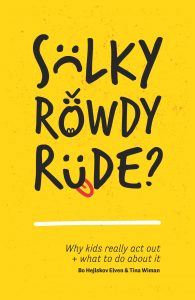
Bo Hejlskov Elven is a parent and one of Europe’s leading clinical psychologists specialising in challenging behaviour. In this new blog for JKP he offers insights into how the low arousal approach informs his new book (written in collaboration with Tina Wiman) on parental strategies for managing the most challenging behaviour of any child, Sulky, Rowdy, Rude?: Why kids really act out and what to do about it.
The psychologist Douglas MacGregor proposed a theory of motivation in the sixties. He argued that we can view humans in two different ways: Either we think that people are lazy and need to be controlled and motivated by rewards and punishment, or we think that people do their best if we create the right environment for them to develop autonomy. His theory was on management, and he and later psychologists have shown that the second view increases productivity. In our book Sulky, Rowdy, Rude? we adapt that way of thinking to parenting. This is in no way controversial in Scandinavia, where we live, but may be a less common view in other parts of the world.
The book is about managing children with strong feelings. All parents have experienced a child in affect, at least when the child was very young. As the child gets older, the meltdowns decrease because the child gets better at regulating affect. A new born loses control as soon as the feeling of hunger arises, a five year old can be hungry for a while. And a one year old child will start to cry when mum says no, a three year old will not, but will be grumpy instead. The child is developing affect regulation.
When we talk about children with strong feelings what we actually mean is children whose affect regulation is as if it was a younger child. The reasons for this delay can be diverse, it is common if the child has a cognitive disability, has autism or ADHD, but also if the child lives under stress. But many children who do not meet the diagnostic criteria of a disability still have strong feelings and need the same kind of support as children with special needs in order to thrive and have a good childhood. The book Sulky, Rowdy, Rude? is a guide for parents of these children, whether the children have special needs or not. And parents of garden variety children can read the book as well and become better at managing difficult situations. Because the world hasn’t yet seen a child who did not lose control and act out once in a while.
The book is not on how parents teach their children to regulate affect.The book is on how parents can manage difficult situations in everyday family life using low arousal approaches. Children grow, they learn slowly but surely, and most children learn to regulate their affect well enough with age. But parents still need to be able to manage the situations and conflicts arising along the way. In order to do that we are helped by understanding how children think and feel, and, not the least, what happens in difficult situations in everyday life. In the book we have formulated a number of principles as a guide for both thinking and acting when conflicts arise in everyday situations.
The most important one is probably: Affect is contagious.
When a child is stressed we as parents become stressed as well. When a parent is angry young children will lose their self control while older children might become angry as well. This means that we as parents should avoid expressing feelings towards the children that we don’t want the children expressing towards us. But we also need to think about how we can protect ourselves from being smitten with the strong feelings the children express.
This is not about suppressing feelings. This is about keeping cool in order to solve problems instead of loosing control. It isn’t about ignoring the children either, or letting them get away with anything. It is about what works. About how we can create a good affective environment for children to grow up in, and how they can learn to regulate their affect by our role modelling.
Another principle is: You need to be in control of yourself in order to corporate.
As parents we often believe that we need to control our children. We are afraid to lose control. Often we try to gain control over the child, sometimes even using force. The problem is that both we and the child loses some control in situations characterised by dominance, discipline or force. Only if the child has full self-control is she able to do what’s expected of her. This means that every parent must work towards maximising the self-control of their children. We do that by using strategies based on the principle of affect contagion. Instead of raising our voices we can stay calm in order to help the child stay calm. We can step back when placing a demand instead of stepping forward. We can avoid using prolonged eye contact as a way to dominate the child. And we can avoid grabbing the child with tense muscles.
Another aspect of this principle is that punishment is not an option.
No research has ever shown positive results of punishing children, just as we have no scientific proof that criminals become less criminal by going to prison. Punishment is about controlling the child, not helping the child come to the right decisions by themselves. Nobody wants their children to grow up and become obedient adults. We want our children to become calm, independent and autonomous adults. The best way to accomplish that is to train the children in making autonomous decisions.
Raising children is not an easy task that can be taught in a blog text. It can’t be taught in a book either. But the principles behind good parenthood fits in a book. And if we limit ourselves to the principles of managing children with strong feelings it is absolutely possible to fit them between two book covers. Raising children with strong feelings is a huge task that calls for many skills and talents. Skills and talents that can be learned. By using low arousal approaches we can manage even the most difficult situations in a good way, giving us parents an easier life and the child a better childhood.
If you would like to read more articles like Bo’s and get the latest news and offers on any of our books on autism & related conditions, special education, parenting + more why not join our mailing list? We can send information by email or post as you prefer, and please also tell us about your areas of interest so we can send the most relevant information. You can unsubscribe at any time.

thankyou
This looks a book that will provide some much needed parenting skills. I’m 61 trying to homeschool and raise a 12 year old daughter afflicted with FAS. I need to find a better way and stop trying to control by punishment and fear of consequences.
I’m releasing everyday and determined to make a positive difference. Look forward to reading more.
I am interested in any literature,I myself have twins with severe Autism and developmentally delayed, I also have 3 other children and my twins are the youngest nearly 16, I am wanting to look into this as a career as I am still young at 41 also my eldest daughter is wanting to work with children in protection and so fourth,
Hi Leeah, do sign up to our mailing list at intl.jkp.com/mailing to receive our catalogues, we publish many suitable books. Also take a look at http://www.autism.org.uk for advice on careers and other useful information.